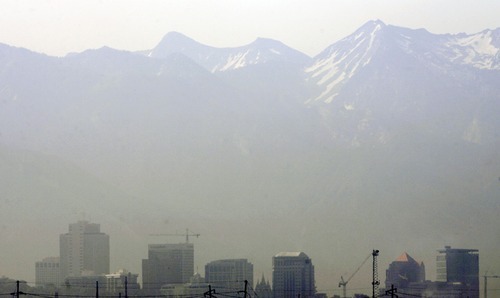This is an archived article that was published on sltrib.com in 2011, and information in the article may be outdated. It is provided only for personal research purposes and may not be reprinted.
Jeff Edwards, president of the Economic Development Corp. of Utah, gets nervous every winter when he is scheduled to host out-of-state visitors representing companies considering moving their operations here and bringing jobs to the state.
He just never knows whether, when those visitors arrive, the Salt Lake area will be enveloped by one of the periodic wintertime inversions that traps a thick layer of foul, dirty air on the valley floor.
"We all just cross our fingers and hope it is not going to be one of those weeks," Edwards said.
As one of the state's leading economic development proponents, Edwards' job is to convince companies that Utah is a great place to do business. And that can be more difficult when he and other EDCU representatives have to deal with questions about the dirty air and quality of life.
Edwards was one of four speakers at a Salt Lake Chamber panel discussion Wednesday that addressed the "business case for clean air."
The program was part of an effort by the Salt Lake Chamber to encourage business owners and operators to begin thinking about actions that will help clean up the Salt Lake Valley's air. Panelists were Edwards; Kelly Sanders, president and CEO of Kennecott Utah Copper; Alan Matheson, senior environmental adviser for the state; and Craig Wagstaff, senior vice president of Questar Corp.
Although they acknowledged that the state's air pollution problem is serious, when it comes to the state's corporate recruitment efforts it isn't impossible to overcome.
Representatives for eBay, which earlier this year announced it would expand its operations in the Draper area while adding thousands of jobs in coming years, said it was aware of the Salt Lake Valley's winter air pollution problems before it made the decision to expand.
"Ebay is a company that tries to look out for the health and safety of our employees, and in weighing the pros and cons [of expanding], air quality was a definite negative on our list," Annie Lescroart, senior manager of sustainability, said via telephone from the company's headquarters in California. "For us, though, the pros far outweighed the cons."
She added that eBay also saw its expansion as an opportunity for it to make its own contributions to cleaner air in Utah.
Ebay's new operations will be housed in a LEED Gold Standard building, and it will sit right on a planned FrontRunner line, she said. "And there will be a number of additional [clean air] initiatives as well."
Sanders said he doesn't think any regulatory agency is going to solve the problem.
"It will be solved by businesses," he said, adding that it will be harder for companies to sustain and grow their operations if they don't address the community's demand that they help improve the environment.
He described several programs Kennecott has launched to help clean up the air. For years, Kennecott has been near the top of the Environmental Protection Agency's list of the nation's biggest polluters. "Each of our plants has a green house emissions team that looks for ways to reduce our carbon footprint," Sanders said. Also, Kennecott's regional headquarters in the Daybreak development was the first LEED platinum-rated building in Utah, he said.
LEED stands for Leadership in Energy and Environmental Design. It's a program of the nonprofit U.S. Green Building Council, which provides an independent third-party verification that a building was built in an environmentally responsible fashion and is a healthy place to work. The ranking system goes from a basic LEED-certified building to silver, gold and platinum. Each step signifies more effort and success in achieving environmentally friendly construction and energy efficiency.
Kennecott also supported the extension of light rail into Daybreak, which provides those working in the building an opportunity to get to work without putting a vehicle on the road. Kennecott's Bingham Canyon mine soon will switch over to using more efficient ore trucks that can haul 320 tons of rock in a single load versus 240 tons, making for fewer loads.
These steps make business sense, he said. "They have put a lot of dollars into our pocket and contributed to clean air at the same time."
Questar's Wagstaff spoke of the contributions that expanded use of natural gas as a transportation fuel can play in helping clean up the air. As an example, he said that the reduction in air pollution achieved from just one trash truck running on natural gas is the equivalent of removing 325 passenger vehicles from the state's roads.
"About half of our fleet, or about 600 vehicles, run on natural gas, and it saves us $1 million a year," Wagstaff said. He added the company hopes to soon convert most of its fleet to natural gas.
Edwards said when visitors from out-of-state question him about the area's air pollution, he acknowledges the problem. But he also tells them that state and local governments, and businesses, have initiatives in place to address the problem— initiatives that include the development of additional mass transit, public-awareness campaigns and sustainability efforts.



